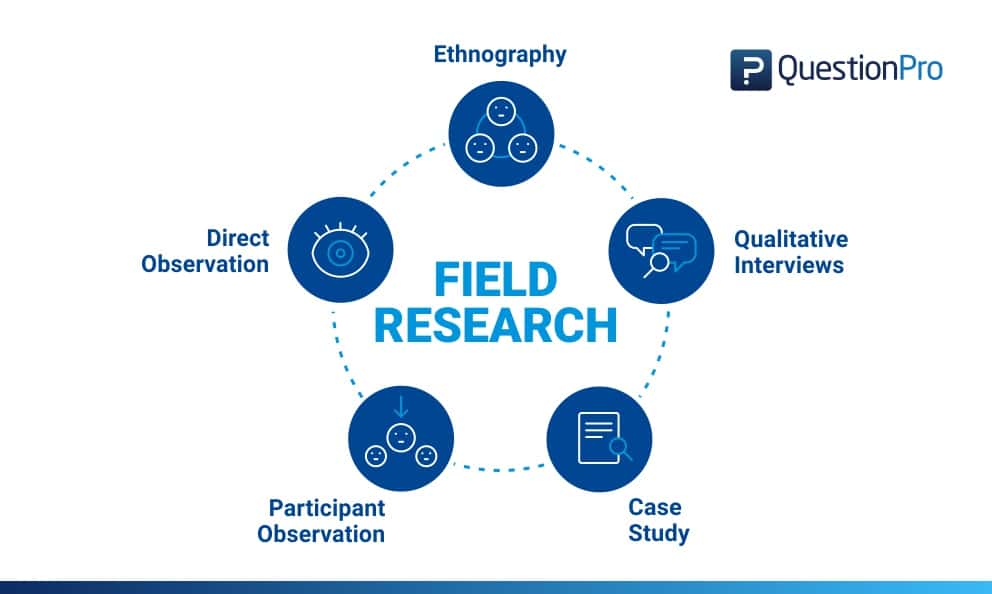
What is Field Research?
Field research is defined as a qualitative method of data collection that aims to observe, interact and understand people while they are in a natural environment. For example, nature conservationists observe behavior of animals in their natural surroundings and the way they react to certain scenarios. In the same way, social scientists conducting field research may conduct interviews or observe people from a distance to understand how they behave in a social environment and how they react to situations around them.
Learn more about: Market Research
Field research encompasses a diverse range of social research methods including direct observation, limited participation, analysis of documents and other information, informal interviews, surveys etc. Although field research is generally characterized as qualitative research, it often involves multiple aspects of quantitative research in it.
Field research typically begins in a specific setting although the end objective of the study is to observe and analyze the specific behavior of a subject in that setting. The cause and effect of a certain behavior, though, is tough to analyze due to presence of multiple variables in a natural environment. Most of the data collection is based not entirely on cause and effect but mostly on correlation. While field research looks for correlation, the small sample size makes it difficult to establish a causal relationship between two or more variables.
Methods of Field Research
Field research is typically conducted in 5 distinctive methods. They are:
- Direct Observation
In this method, the data is collected via an observational method or subjects in a natural environment. In this method, the behavior or outcome of situation is not interfered in any way by the researcher. The advantage of direct observation is that it offers contextual data on people management, situations, interactions and the surroundings. This method of field research is widely used in a public setting or environment but not in a private environment as it raises an ethical dilemma.
- Participant Observation
In this method of field research, the researcher is deeply involved in the research process, not just purely as an observer, but also as a participant. This method too is conducted in a natural environment but the only difference is the researcher gets involved in the discussions and can mould the direction of the discussions. In this method, researchers live in a comfortable environment with the participants of the research design, to make them comfortable and open up to in-depth discussions.
- Ethnography
Ethnography is an expanded observation of social research and social perspective and the cultural values of an entire social setting. In ethnography, entire communities are observed objectively. For example, if a researcher would like to understand how an Amazon tribe lives their life and operates, he/she may chose to observe them or live amongst them and silently observe their day-to-day behavior.
- Qualitative Interviews
Qualitative interviews are close-ended questions that are asked directly to the research subjects. The qualitative interviews could be either informal and conversational, semi-structured, standardized and open-ended or a mix of all the above three. This provides a wealth of data to the researcher that they can sort through. This also helps collect relational data. This method of field research can use a mix of one-on-one interviews, focus groups and text analysis.
- Case Study
A case study research is an in-depth analysis of a person, situation or event. This method may look difficult to operate, however, it is one of the simplest ways of conducting research as it involves a deep dive and thorough understanding the data collection methods and inferring the data.
Steps in Conducting Field Research
Due to the nature of field research, the magnitude of timelines and costs involved, field research can be very tough to plan, implement and measure. Some basic steps in the management of field research are:
- Build the Right Team: To be able to conduct field research, having the right team is important. The role of the researcher and any ancillary team members is very important and defining the tasks they have to carry out with defined relevant milestones is important. It is important that the upper management too is vested in the field research for its success.
- Recruiting People for the Study: The success of the field research depends on the people that the study is being conducted on. Using sampling methods, it is important to derive the people that will be a part of the study.
- Data Collection Methodology: As spoken in length about above, data collection methods for field research are varied. They could be a mix of surveys, interviews, case studies and observation. All these methods have to be chalked out and the milestones for each method too have to be chalked out at the outset. For example, in the case of a survey, the survey design is important that it is created and tested even before the research begins.
- Site Visit: A site visit is important to the success of the field research and it is always conducted outside of traditional locations and in the actual natural environment of the respondent/s. Hence, planning a site visit alongwith the methods of data collection is important.
- Data Analysis: Analysis of the data that is collected is important to validate the premise of the field research and decide the outcome of the field research.
- Communicating Results: Once the data is analyzed, it is important to communicate the results to the stakeholders of the research so that it could be actioned upon.
Field Research Notes
Keeping an ethnographic record is very important in conducting field research. Field notes make up one of the most important aspects of the ethnographic record. The process of field notes begins as the researcher is involved in the observational research process that is to be written down later.
Types of Field Research Notes
The four different kinds of field notes are:
- Job Notes: This method of taking notes is while the researcher is in the study. This could be in close proximity and in open sight with the subject in study. The notes here are short, concise and in condensed form that can be built on by the researcher later. Most researchers do not prefer this method though due to the fear of feeling that the respondent may not take them seriously.
- Field Notes Proper: These notes are to be expanded on immediately after the completion of events. The notes have to be detailed and the words have to be as close to possible as the subject being studied.
- Methodological Notes: These notes contain methods on the research methods used by the researcher, any new proposed research methods and the way to monitor their progress. Methodological notes can be kept with field notes or filed separately but they find their way to the end report of a study.
- Journals and Diaries: This method of field notes is an insight into the life of the researcher. This tracks all aspects of the researchers life and helps eliminate the Halo effect or any research bias that may have cropped up during the field research.
Reasons to Conduct Field Research
Field research has been commonly used in the 20th century in the social sciences. But in general, it takes a lot of time to conduct and complete, is expensive and in a lot of cases invasive. So why then is this commonly used and is preferred by researchers to validate data? We look at 4 major reasons:
- Overcoming lack of data: Field research resolves the major issue of gaps in data. Very often, there is limited to no data about a topic in study, especially in a specific environment analysis. The research problem might be known or suspected but there is no way to validate this without primary research and data. Conducting field research helps not only plug-in gaps in data but collect supporting material and hence is a preferred research method of researchers.
- Understanding context of the study: In many cases, the data collected is adequate but field research is still conducted. This helps gain insight into the existing data. For example, if the data states that horses from a stable farm generally win races because the horses are pedigreed and the stable owner hires the best jockeys. But conducting field research can throw light into other factors that influence the success like quality of fodder and care provided and conducive weather conditions.
- Increasing the quality of data: Since this research method uses more than one tool to collect data, the data is of higher quality. Inferences can be made from the data collected and can be statistically analyzed via the triangulation of data.
- Collecting ancillary data: Field research puts the researchers in a position of localized thinking which opens them new lines of thinking. This can help collect data that the study didn’t account to collect.
Examples of Field Research
Some examples of field research are:
- Decipher social metrics in a slum
Purely by using observational methods and in-depth interviews, researchers can be part of a community to understand the social metrics and social hierarchy of a slum. This study can also understand the financial independence and day-to-day operational nuances of a slum. The analysis of this data can provide an insight into how different a slum is from structured societies. - Understand the impact of sports on a child’s development
This method of field research takes multiple years to conduct and the sample size can be very large. The data analysis of this research provides insights into how the kids of different geographical locations and backgrounds respond to sports and the impact of sports on their all round development. - Study animal migration patterns
Field research is used extensively to study flora and fauna. A major use case is scientists monitoring and studying animal migration patterns with the change of seasons. Field research helps collect data across years and that helps draw conclusions about how to safely expedite the safe passage of animals.
Advantages of Field Research
The advantages of field research are:
- It is conducted in a real-world and natural environment where there is no tampering of variables and the environment is not doctored.
- Due to the study being conducted in a comfortable environment, data can be collected even about ancillary topics.
- The researcher gains a deep understanding into the research subjects due to the proximity to them and hence the research is extensive, thorough and accurate.
Disadvantages of Field Research
The disadvantages of field research are:
- The studies are expensive and time-consuming and can take years to complete.
- It is very difficult for the researcher to distance themselves from a bias in the research study.
- The notes have to be exactly what the researcher says but the nomenclature is very tough to follow.
- It is an interpretive method and this is subjective and entirely dependent on the ability of the researcher.
- In this method, it is impossible to control external variables and this constantly alters the nature of the research.







